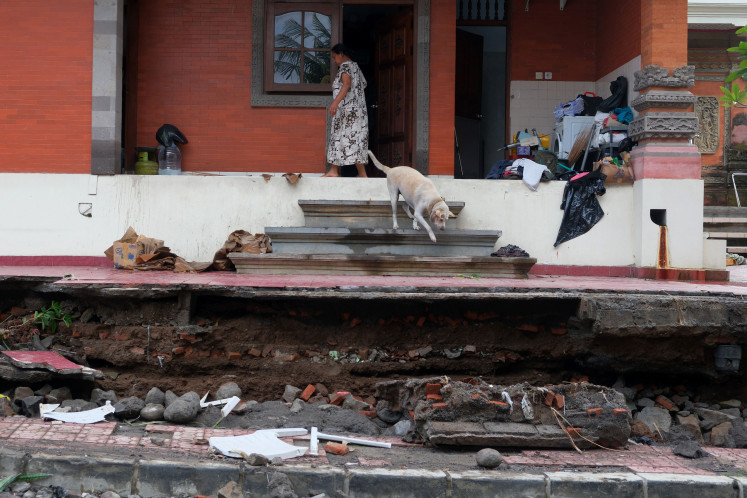Popular Reads
Top Results
Can't find what you're looking for?
View all search resultsPopular Reads
Top Results
Can't find what you're looking for?
View all search resultsMental health: A too-long overlooked problem
The world has started to pay serious attention to mental health
Change text size
Gift Premium Articles
to Anyone
T
he world has started to pay serious attention to mental health. The last World Health Day on April 7, 2017 was themed “Depression: Let’s talk,” translated as “Depresi, yuk curhat,” while World Mental Health Day on Oct. 10, 2017 raised awareness on mental health in the workplace. Unfortunately, little has been done to improve mental health in Indonesia.
Mental health is often seen as the “stepchild” of health care services. Depression, psychosis, anxiety, substance abuse and personality disorders are widespread challenges of the modern world. However, budget allocations for healthcare and the provision of mental health services have been lacking in the Southeast Asia region, particularly in Indonesia.
We have only 0.29 psychiatrists for every 100,000 people. The Philippines has one-and-a-half times our psychiatrist density, and Thailand, Vietnam and Malaysia all have over twice our psychiatrist density.
In addition to the shortage, we have distribution problems, as most psychiatrists are located in major cities.
Rural and at-risk populations have no access to mental health services. In addition, psychiatrists have multiple academic and research commitments, further limiting time for patient encounters.
Combined with social stigma and a general lack of public awareness, people turn to witch doctors for “alternative” therapy to “cure” mental health
disorders.
We have a problem, and we need it to fix it now.
Mental health is a cause of disability and prevents people from being their most productive selves. In Indonesia, over 6 percent of disease is attributable to mental health (Institute for Health Metrics and Evaluation/IHME, 2015). The magnitude of the mental health burden is comparable to HIV and TB combined (5.52 percent) or diabetes (5.34 percent).
However, the public health budget for mental health across all offices of the Ministry of Health is minimal. Not only is the mental health budget estimated to be below 3 percent of the total health budget, but over 90 percent of it is going to mental health hospitals.
There are two things that the government can do to fix the situation: allocate more resources and manage it cost effectively.
First of all, health is an investment. As such, we need to pour money into mental health if we expect to see an outcome. Since mental health struggles are often invisible, it is essential to use quantifiable metrics, such as economic impact, to draw up a head-to-head comparison with other illnesses.
A Harvard analysis in 2015 estimated that the 2012-2030 economic output loss from mental health problems in Indonesia was close to US$1 trillion, higher than the combined loss from diabetes ($200 billion) and cancer ($700 billion). Investing more in mental health is not only a public health and human rights agenda, but also a convincing case economically.
Second, we need to change our spending pattern to get the best return on our investment. Each country spends differently on mental health, but more and more countries are shifting away from mental hospitals toward primary mental health care and prevention. We should follow suit.
Proper diagnosis and management in a primary care setting prevent high costs in mental hospitals. Outpatient treatment for depression, psychosis, anxiety and substance abuse are all feasible, cost-saving and affordable.
An analysis of early mental health intervention in the UK shows that for every $1 spent, we gain more than $10 in benefits. Research conducted in South Asia and sub-Saharan Africa has repeatedly proven the cost-saving characteristics of mental health prevention interventions.
“But we already allocate 5.7 percent of our government expenditure on public health,” people might say. To put this into perspective, a 2014 World Bank study shows that our neighbors spend a lot more than us. The Philippines, Vietnam, Thailand and Malaysia allocated respectively 10.0 percent, 14.2 percent, 13.3 percent, and 6.4 percent of their spending on public health. There’s plenty of room for improvement.
Mental health issues are here and will only grow in the years to come. The first step towards change is the identification and acceptance of a problem. But after that, curhat (talk) is just not enough. Substantial policy changes must be made to tackle this issue.
___________________________
Marco Michael is a graduate of the School of Medicine, University of Indonesia and Monash University, and a research associate at the Suharlim Foundation. Christian Suharlim is a researcher at the Harvard Center for Health Decision Science, working on resource allocation.










